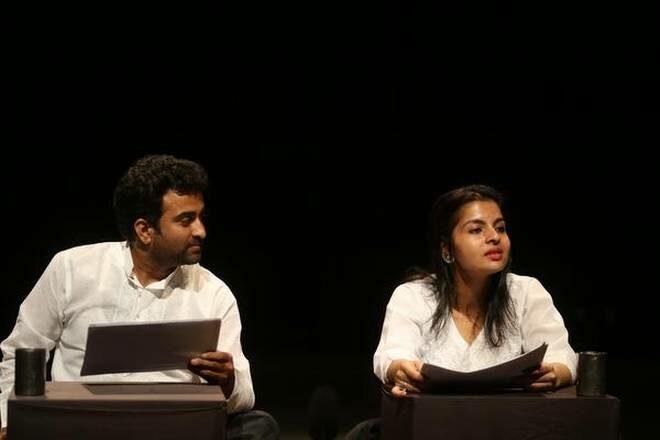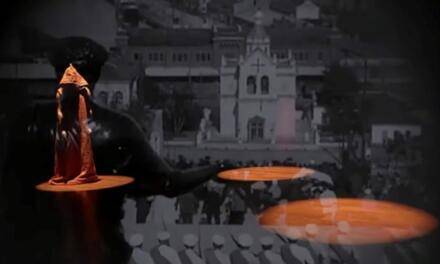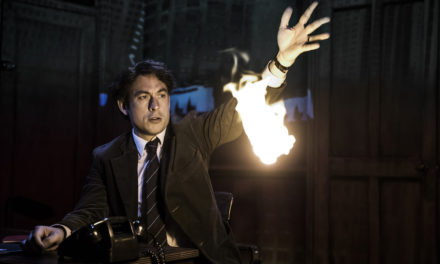The title of the Vijaydan Detha story, ‘Kenchuli’ literally means ‘the remains of the snake,’ or a serpent’s sloughed-off skin after molting. In one pivotal sequence, its pregnant protagonist, Lachchi, sheds trappings of modesty and roams naked to the wind, with only her hair for cover.
In Detha’s ‘Duvidha’, a newly-wed bride, also called Lachchi, discovers that a spirit has taken on the guise of her absent husband to seduce her. She acquiesces to the masquerade and the transgressions it entails, almost willfully.
Theatrical Progress
These powerful moments of feminine agency, among many others, have bookended Ipshita Chakraborty Singh’s fascination with Detha’s works over the years. “That he chose to write so audaciously in the Rajasthani milieu of the 1950s never ceases to amaze me. Perhaps those times were more accepting,” explains the actor-director, while admitting there has been a clear drift towards greater parochialism in recent decades.
This evening, Chakraborty Singh will showcase two of Detha’s stories- ‘Kenchuli’ and ‘Mooji Surma’ – in a rehearsed reading titled Kankad, Moti aur Kinwad, alongside long-time collaborator (and husband) Ajeet Singh Palawat. Their Ujjagar Dramatic Association started out in Jaipur in 2013, but they have been stationed in Mumbai since 2017. Together, and separately, the talented duo has chalked up impressive resumes in Hindi theatre, working with directors across India, while steadily building a body of work with their own troupe.
The duo’s breakthrough success was Kasomal Sapno a Rajasthani Midsummer Night’s Dream, which was in a rare bilateral cultural exchange, staged at Karachi’s NAPA Repertory Theatre in 2015. Mohit Takalkar has frequently directed both actors- the laugh riot Mukaam Dehru Jilaa Nagaur, The Mathemagician, a one-actor piece featuring Chakraborty Singh; and Main Huun Yusuf Aur Yeh Hai Mera Bhai which drew attention to the two NSD-trained actors into national attention.
The first airing of the Detha stories was at Rasika Agashe’s behest in 2017. Kankad, Moti aur Kinvad has since completed ten-odd shows. Tonight’s staging is part of the Five Senses Theatre Group’s Rang Roop Theatre Festival. Chakraborty Singh is ambivalent about mounting ‘Kenchuli’ as a full-fledged play. “There is a woman who emerges in everybody’s mind when they hear the story. I wouldn’t want to impose my own vision on that,” she says of Lachchi, who is a veritable force of nature.
Passion Projects
Adaptations of the story have nonetheless been frequently been performed on the Indian stage, with two films in the pipeline. Although Palawat is a natural reader, Chakraborty Singh instructed him to, “read the piece in such a way that you can see it in your mind,” in a bid to stoke the embers of imagination in audiences much more evocatively. While the dialogue allows the two actors space for repartee, she wanted even the long narrative passages to be delivered with conversational flair rather than the dramatic flourishes that are the wont of most actors. The result is an enactment that is laced with an almost deceptive effortlessness. Although their Mumbai stint has led to multiple opportunities in cinema and beyond, their work with the Ujjagar Dramatic Association has suffered to an extent. Chakraborty Singh hasn’t been able to completely reconcile herself with the touch-and-go schedule of actors in the city, where theatre plays second fiddle to all other openings despite its so-called ‘passion project’ credentials. Last year, they organized one rehearsal schedule for a new multi-lingual play, Olkhan, in Mumbai, before opening it in Jaipur. “I doubt there was even a single day when all actors were present,” Chakraborty Singh remembers. For her, these constraints of space and time are inimical to a project’s natural momentum, and the marination of ideas and essences necessary to build a good play. However, armed with a better understanding of life and distractions in the city, she remains refreshingly upbeat about her upcoming projects
This article was posted with permission from thehindu.com. It was originally published on May 30th, 2019.
This post was written by the author in their personal capacity.The opinions expressed in this article are the author’s own and do not reflect the view of The Theatre Times, their staff or collaborators.
This post was written by Vikram Phukan.
The views expressed here belong to the author and do not necessarily reflect our views and opinions.


















